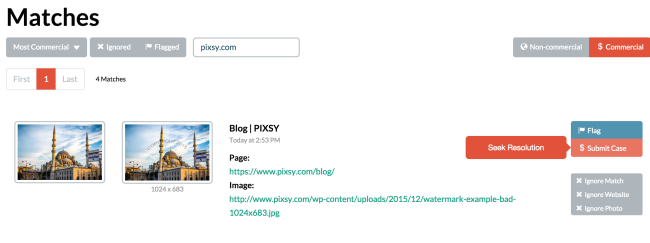
Pixsy
Founder: Daniel Foster
Pixsy is one of the leading reverse image search platforms that helps photographers get compensation for their stolen work. Daniel had reached out to me after I tweeted to a company that used one of my images without my permission; I had hashed tagged the tweet: #copyrightinfringement #photographyrights #copyright. His tweet was a welcome surprise.
Tell us how this project evolved for you.
A friend found one of her best photos used on a website selling holistic healing services. She’s been photographing professionally for twenty years and didn’t know what to do.
I thought it was very unfair that a business was profiting from her work while she was debating whether or not to cancel her health insurance to pay the rent, and realized that photographers need tools to address this problem.
What images were getting stolen from you?
I had a self-portrait used in an online advertisement without permission several years ago, and then observed a few of my architecture photos used without authorization later on.
How do you source the stolen images?
We use reverse image search to find copies, including manipulations, of a photo. From there it is up to the photographer to determine if a displayed use is authorized and if not, what action he or she wishes to take.
How does company sustain itself? Is the income from shared proceeds on the legal cases?
We receive a success-based commission for all payments we collect on behalf of photographers. The vast majority of our platform is free, and we also receive some subscription revenue from premium services such as our DMCA takedown feature.
Are you seeing a trend in stolen information or any particular area?
Image theft occurs in every industry. We’ve noticed that music and concert photographers see their work stolen at a higher rate. Unlicensed use also appears to be a significant problem in the real estate industry.
What is the approx range for cases you’ve settled, lowest and highest?
Various factors influence the amount of compensation we request, including your previous sales history, local law, and the nature of the use. When we pursue a legal settlement, this has ranged from the thousands up to six-figure settlements.
How do I sign up and how much is it?
You can import and track up to 5,000 photos for free. Plans that give you up to 10,000 photos and our DMCA takedown feature start at $9.99 a month. Our service is invitation-only. You can request an invitation on our homepage.
Are there any free resources or is there a subscription plan?
There is a free plan to search up to 5,000 photos.
Can I batch export my photo library and have you scour the internet for usage?
We support one-click import from Flickr, 500px, Tumblr, Photoshelter, Instagram, SmugMug and Dropbox. You can also upload photos or import from a website. We’re adding new import sources on a regular basis.


Walk us through the process of how this works.
Once you sign up and import photos, we begin the search process. Matches typically begin appearing immediately. From there you can browse through your matches. If you find a use of a photo you did not authorize and it is commercial in nature, you can use our “Submit case” feature to send it to our team to review. Depending on the situation and your wishes, we can take steps to secure a license fee for you or refer the matter to one of our law firms around the world.
We’re currently resolving cases in the United States, United Kingdom, Canada, Australia, the Netherlands, Germany, France, Belgium, Luxembourg, and Denmark.

9 Comments
This is a really cool idea and something that has really grown into a need – will definitely check it out!
Thanks for your feedback, Cooper! Let us know if there’s anything we can help you with.
Pixsy Team.
“Local” laws have no application to matters involving copyright law. The Copyright Law a/k/a USC Title 17 is a Federal Statute. All matters involving copyright must be heard in a federal United States District Court.
The major problems with companies who attempt to recover fees for copyright infringement is that they: * rarely use lawyers preferring to settle quickly on the cheap;
*, do not actually file cases so do not meet with judges or magistrates to maximize recoveries or force rational settlements;
* have no idea what these type cases settle for in court or before court when the creator is represented by an attorney;
* that no intelligent or experienced defense attorney takes any of these type companies seriously until/unless they sue which the companies are loathe to do;
* do not tell their clients that when a creator prevails in a copyright action in federal court on a registered work he/she is entitled by statute to seek all or even more than all of the attorneys fees and costs incurred by the creator/photographer;
* the amount any case is worth is a product of a long list of factors including: FEDERAL LAW, the knowledge and experience of the creator’s attorney with similar cases brought in that particular courthouse, the use of the image, whether the use was willful (which may give rise to statutory damages of $30,000- 150,000 regardless of what a license fee would have been), the reputation of the photographer and so on. Statutory damages need not have any relation to actual damages, none.
Register all of your work all of the time. Employ competent, local, experienced copyright counsel to assess the value of your case. When you need a doctor, see a doctor. When you need a CPA, see a CPA. When you need a lawyer, see a lawyer.
I am but one of several thousand attorneys all over America who do this work on a regular basis. Attorneys for infringers who know the field call these companies “pioneers” – meaning they settle early. When they do use an attorney, they pick their attorney to represent you and the net result is that the creator recovers a further reduced “net” recovery.
Thanks for your comment, Edward!
However, you might have misunderstood some of Daniel’s points. By “local laws” he meant copyright laws specific to countries other than the US (similar to U.S. Copyright Office in the States).
As for your points concerning some companies recovering compensation for copyright infringement, we can’t speak for all, but Pixsy:
– works with a vast and ever growing network of highly-professional and hand-picked law firms around the globe.
– never settles “quick on the cheap” and looks into each case to get the best possible outcome.
– If necessary, Pixsy attorneys go to court and represent the client just like the individual attorneys. In that case, our client still gets 50% of the overall claimed compensation and we deal with the substantial legal fees on our own. The difference is our client is saved of all the stress and lost time in the court rooms.
– we make sure that our photographers are aware of all their rights, inside and outside the court.
– we work together with the clients to determine the best possible outcome and compensation.
Overall, the points you brought up, might be true for some companies, but are completely unjust when it comes to Pixsy. There’s nothing wrong in promoting your professional services, but it doesn’t seem fair if you do so by presenting the points without clear prior research.
Best regards,
Pixsy Team.
A client must appear in Federal Court during any settlement discussions before a judge or Magistrate. Depositions require physical presence. If long distances are involved or the client is physically unable to travel some judges and magistrates permit appearances by Skype or telephone. There is no time saving for a client who is involved/invested in a litigation. We ALWAYS want our client in the courtroom as having him/her physically present shows their interest in their own case. We prep them to speak to the judge or Magistrate directly which maximizes their recoveries.
Please list – this is a public record anyhow – the names of the cases and the District Courts in which they were filed by Pixsy. I will give you my list which is available to anyone by merely searching the ie. USDC data base, Southern District of NY and using “Edward C. Greenberg'” as “attorney”. Since your lawyers are so numerous and prestigious why not list them? We have litigated some 130+ cases in that NYC
Federal Court alone. We have had other cases in other districts. All public information.
How many cases have Pixsy’s lawyers actually litigated or even filed? What are the names of your lawyers? Do you list them on your site? Any lawyer can be similarly searched so that any prospective client can determine whether that lawyer actually litigates these type cases in their local area whether Fresno, San Antonio or Boston, who they represented and the nature of the claim. Most if not all court papers submitted by both sides can be read by anyone on line. (Exceptions for confidential settlements and cases involving children) Many lawyers are IP or copyright lawyers who NEVER go to court or try cases. Your prospective customers ought be able to ascertain the nature and quality of your stable of attorneys, their experience and fees.
Clients are unfamiliar with USC Title 17 or USC Title 12 which gives the parameters for damages available from the courts via judge and/or jury. Only a trained lawyer can educate a creator as to what those perimeters are and only a lawyer who actually tries cases can assess the value of any case for settlement or trial purposes. Photographers have no more expertise in those matters than lawyers have with respect to filters, f stops or lighting techniques.
Most importantly, on what basis can Pixsy – or any other search firm – lay claim to monies due solely to the author? No agent, rep, stock agency or search firm has any claim to monies recovered for copyright infringement UNLESS some creator is frankly, dumb enough to give his/her money away. Why would a creator need your company to simply hire competent counsel?
You offer 50% of the compensation??? Let’s do some math shall we. Say a case settles @50k, 150k or 350k. If represented by counsel and the image registered timely the settlement number would be higher to account for attorneys fees and expense. Our clients and those of most attorneys would receive NOT LESS THAN 60% -75% of that gross BUT if the case were tried and attorneys fees awarded the client nets between 65 – 100% of the damages award. The attorneys fees are paid by the loser to the creator’s law firm directly.
If you would like to debate these issues in a live public forum I am game. You can contact me @ ecglaw@gmail.com.
With regard to your claim of lacking “prior research”.
Jack Reznicki and I have authored two books, the most recent The Copyright Zone (Focal Press) hundreds of articles and have hundred countless seminars under our respective belts covering 37 years.
I have litigated, served as an expert witness and/or co-counsel several thousand cases many of which involved search firms. I have authored proposed copyright legislation for the US Congress with Prof. Nimmer and have had several thousand court appearances and depositions in copyright cases. We have researched and deal with search firms daily. I have been consulted by countless defense attorneys on the methods and manners on how to deter or settle cheap with search companies. I have been qualified as an “expert witness” in the field.
There are many other attorneys as qualified as I am in this field. There are NO search companies as qualified as any of the qualified attorneys who practice in this field in NY, LA, Miami, Boston and elsewhere or photographer Jack Reznicki for that matter. I have been dealing with search companies in one form or another for over three decades. Your claim of “no research” is simply baseless.
Answering a question posed to me directly via e mail (twice):
Conversations had between a photographer/creator and a search firm employee are NOT legally privileged and thus are wide open for the infringer’s attorneys to dissect. Conversations between a photographer/creator and an attorney ARE legally privileged and can not be disclosed in depositions or at trial.
Real life – photographer tells search firm employee “I would be happy with $5,000”. That conversation can come out in deposition, settlement or trial and be used against the photographer who may have a case worth 10 or 15 times that amount. When it does – and it will – the judge and/or jury will use it against the creator thinking him/her greedy in seeking substantially more than the amount that the creator said would make him/her “happy”.
I finally received my invite to sign up for Pixsy. It did a good job of finding images being used without permission. However, when I tried to submit a claim I was informed that they don’t do claims for images that were created for paying clients.
Doesn’t that exclude a majority of images from any professional photographer?
Yes, of course it does. No one from Pixsy will address the issues Mr. Reznicki and I raise on a regular basis. They will not cite to actual, filed legal cases which they are prosecuting, identify their lawyers by name nor represent what training (if any) their non-lawyers have.
Like other search firms, the facts don’t live up to the hype. If your image is infringed, go see a local lawyer experienced in such matters.
Comments are closed for this article!